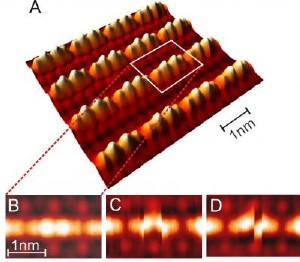Oct 6 2008
With nanotechnology yielding a burgeoning menagerie of microscopic pumps, motors, and other machines for potential use in medicine and industry, here is one good question: How will humans turn those devices on and off? In an advance toward giving humans that control, scientists in The Netherlands are reporting use of an external electrical signal to control an atomic-scale mechanical device that looks like the flippers on a pinball machine. Their report is scheduled for the Oct. 8 issue of ACS' monthly journal Nano Letters.
 Scientists are reporting construction and testing of a nanotech device that responds to on-off stimuli and resembles flippers on a pinball machine. Credit: Harold J. W. Zandvliet
Scientists are reporting construction and testing of a nanotech device that responds to on-off stimuli and resembles flippers on a pinball machine. Credit: Harold J. W. Zandvliet
In the study, Harold J. W. Zandvliet and colleagues point out that efforts to build ever-smaller mechanical devices have made scientists recognize the difficulty of exerting control over these nanomachines, which are too tiny for any conventional on-off-switch. They describe construction and successful testing of a device, "grown" on a wafer of germanium crystal, that responds to on-off stimuli.
Researchers say the device — so tiny that billions would fit on the head of a pin — resembles the arms or flippers on a pinball machine. The signals for the arms to move back and forth come from the tip of a scanning tunneling microscope. "By precisely controlling the tip current and distance, we make two atom pairs behave like the flippers on an atomic-sized pinball machine," they state. "Our observations prove unambiguously that it is possible to control an atomic scale mechanical device using a simple electrical signal. A better understanding of similar devices can shed light on the future possibilities and opportunities for the application of atomic-scale devices."